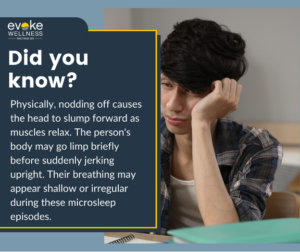Have you ever found yourself nodding off unexpectedly during the day? You may think it’s just a momentary lapse, but repeated instances of microsleep can indicate serious health issues. Recent studies show over 30% of adults experience microsleep regularly. Understanding the causes and risks allows you to take action to improve your wellbeing. At Evoke Wellness, we provide integrated treatment for the underlying issues leading to nodding off, including programs for drug addiction, heroin addiction, opioid addiction, fentanyl addiction, meth addiction, and dual diagnosis. Our goal is helping you reclaim health, prevent microsleep episodes, and enjoy each day to the fullest.
Together, let’s embrace the journey to recovery and the promise of a new beginning. Call us at (833) 287-7223 today or reach out online.
What Is “Nodding Off”?
“Nodding off” refers to a semi-conscious state induced by opioid drugs like heroin, fentanyl, or prescription painkillers. It involves repeatedly losing and regaining consciousness for brief periods – a dangerous form of microsleep.
Signs & Effects
- Head dropping forward or “nodding”
- Slurred speech and slowed breathing
- Impaired motor skills and response times
This sedated state significantly raises the risks of accidental overdose, injury, or even death if left unattended. Chronic “nodding” can also lead to severe health issues.
A Concerning Trend
A 2021 study found nearly 1 in 4 opioid users reported regularly “nodding off” while using. With opioid addictions and overdoses surging, this microsleep phenomenon has become alarmingly common – a harsh reality underscoring the importance of comprehensive substance abuse addiction treatment programs.
What Causes People to Nod Off?
Lack of Sleep
One of the primary reasons people nod off is a lack of adequate sleep. When the body doesn’t get enough rest, it struggles to stay alert and focused, leading to unintentional brief episodes of sleep known as microsleep.
Fatigue and Exhaustion
Individuals who experience physical or mental exhaustion are also prone to nodding off. Strenuous activities, demanding work schedules, or medical conditions that cause fatigue can make it challenging to stay awake and attentive.
Sedating Medications
Certain medications, such as antihistamines, muscle relaxants, or opioid painkillers, can have a sedative effect, increasing the likelihood of microsleep episodes. It’s crucial to be aware of the potential side effects and take necessary precautions.
Monotonous Tasks
Engaging in monotonous or repetitive tasks for an extended period can lead to a state of boredom or inattention, increasing the risk of nodding off. This is particularly common during activities like driving long distances or attending lectures.
Sleep Disorders
Individuals with sleep disorders, such as sleep apnea or narcolepsy, may experience frequent episodes of nodding off due to disruptions in their sleep patterns or an inability to regulate sleep-wake cycles effectively.
Nodding off can be dangerous, especially in situations where alertness is crucial, such as operating machinery or driving. Seeking professional help from a sleep specialist, managing stress, and maintaining a healthy sleep routine can help mitigate the risk of unintentional microsleep episodes.
The Dangers of Nodding Off
Microsleep Episodes
Nodding off refers to brief episodes of sleep that can last from a few seconds up to 30 seconds. These unintentional lapses in consciousness, known as microsleep, significantly impair cognition and performance. Even a few seconds of microsleep while driving can be catastrophic.
Increased Accident Risk
Studies show that drowsy driving accounts for hundreds of thousands of motor vehicle crashes each year. Nodding off behind the wheel makes you three times more likely to be involved in a car crash. The consequences can be devastating, leading to injuries, fatalities, and immense emotional trauma.
Impaired Cognitive Function
When you nod off, your brain experiences momentary lapses in attention and alertness. This can severely impact your ability to process information, make decisions, and react quickly to changing situations. Microsleep episodes can occur without warning, putting you and others at risk in various settings, such as operating machinery or performing critical tasks.
To prioritize your well-being and safety, it’s crucial to recognize the signs of drowsiness and take appropriate measures. At Evoke Wellness at Waltham, our comprehensive programs, including drug addiction treatment, heroin addiction treatment, opioid addiction treatment, fentanyl addiction treatment, meth addiction treatment, and dual diagnosis treatment, address the underlying factors contributing to fatigue and nodding off, ensuring a holistic approach to your recovery.
Recognizing the Signs of Nodding Off
Behavioral Changes
You may notice someone nodding off exhibiting behavioral shifts. Their speech becomes slurred, responses delayed. They appear drowsy, disoriented – struggling to stay awake and focused. Frequent yawning and closed eyes that snap back open are telltale signs.
Physical Signs
Impaired Functioning
When nodding off, basic functioning becomes impaired. Simple tasks are difficult – reading, following conversations, or staying attentive. Reaction times slow drastically, increasing accident risks if driving or operating machinery. Severe cases involve losing complete awareness of one’s surroundings for seconds or minutes at a time.
Recognizing these signs of nodding off, from subtle behavioral cues to obvious physical manifestations, is crucial for preventing dangerous situations. Seek help from evoke wellness’ addiction treatment programs covering heroin, opioids, meth, and dual diagnosis if substance abuse is a contributing factor.
Seeking Treatment for Underlying Conditions
Persistent microsleep episodes can signify an underlying medical or mental health condition that requires professional treatment. Left unaddressed, these issues may worsen and lead to severe consequences like accidents, injuries, or impaired daily functioning.
Identifying Root Causes
Microsleep often stems from sleep disorders like sleep apnea, insomnia, narcolepsy, or restless leg syndrome. Mental health conditions like depression, anxiety, and stress can also disrupt sleep patterns and trigger involuntary napping episodes.
Comprehensive Care
Effective treatment plans frequently involve a multidisciplinary approach targeting the root cause. This may include medications, therapy, lifestyle changes, or a combination tailored to your specific needs.
Evoke Wellness at Waltham offers specialized programs to address underlying issues that contribute to microsleep:
- Drug addiction treatment program
- Heroin addiction treatment program
- Opioid addiction treatment program
- Fentanyl addiction treatment program
- Meth addiction treatment program
- Dual diagnosis treatment program
By seeking professional help and adhering to an evidence-based treatment plan, you can manage the root causes, improve sleep quality, and reduce microsleep episodes – enhancing safety and overall well-being.
FAQ: Nodding Off and Drug Addiction Treatment Programs
Comprehensive Care
Our addiction treatment programs provide comprehensive care for those struggling with substance abuse issues leading to “nodding off” or microsleep episodes. We offer specialized tracks for overcoming addictions to heroin, opioids like fentanyl, methamphetamines, and other drugs.
Dual Diagnosis Approach
Many who experience nodding off have co-occurring mental health disorders. Our dual diagnosis program addresses both the addiction and any underlying psychological conditions through an integrated, evidence-based approach.
Personalized Treatment Plans
Each patient receives a personalized treatment plan tailored to their unique needs and situation. Our multi-disciplinary teams utilize a wide range of therapies, including:
- Cognitive-behavioral therapy
- Medication-assisted treatment
- Individual and group counseling
- Family therapy
- Holistic healing practices
Continuum of Care
Recovery is an ongoing journey. Our continuum of care provides a seamless transition through all levels of treatment – from detox and residential care to outpatient programs and sober living. Our comprehensive aftercare planning helps prevent relapse.
Conclusion
In summary, nodding off or microsleeps are brief episodes of sleep that occur when a person is fatigued but trying to stay awake. They usually last just seconds or minutes but can be extremely dangerous if happening during activities like driving. Be mindful of getting quality sleep and speak to a doctor if excessive daytime sleepiness persists. Entering an addiction treatment program may help those using substances that promote sleepiness. With awareness and lifestyle changes, the risks associated with nodding off can often be reduced.
Begin Your Journey with Evoke Wellness at Waltham
If you or a loved one is considering outpatient treatment, Evoke Wellness at Waltham invites you to contact us. Our compassionate team is ready to answer your questions, discuss your needs, and help you take the first steps toward recovery. At Evoke Wellness, you will find more than just a treatment program – you’ll discover a community dedicated to your wellness and success. Together, let’s embrace the journey to recovery and the promise of a new beginning. Call us at (833) 287-7223 today or reach out online.



